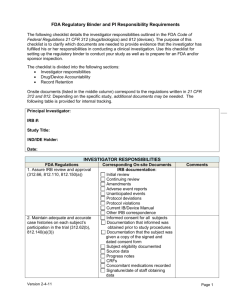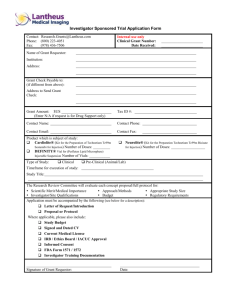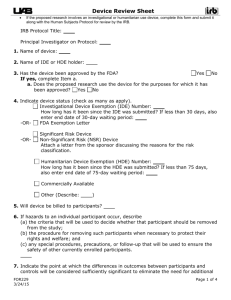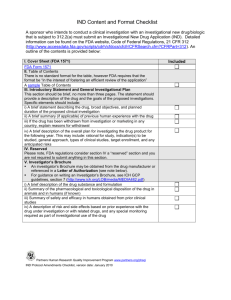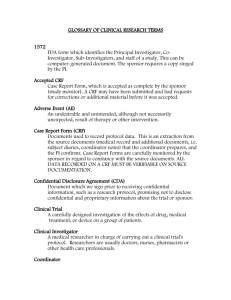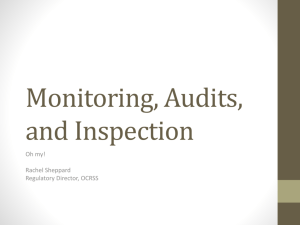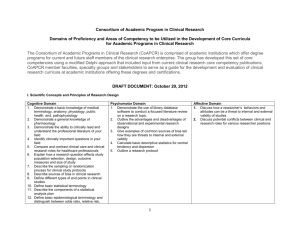Frances Richmond Director International Center for
advertisement
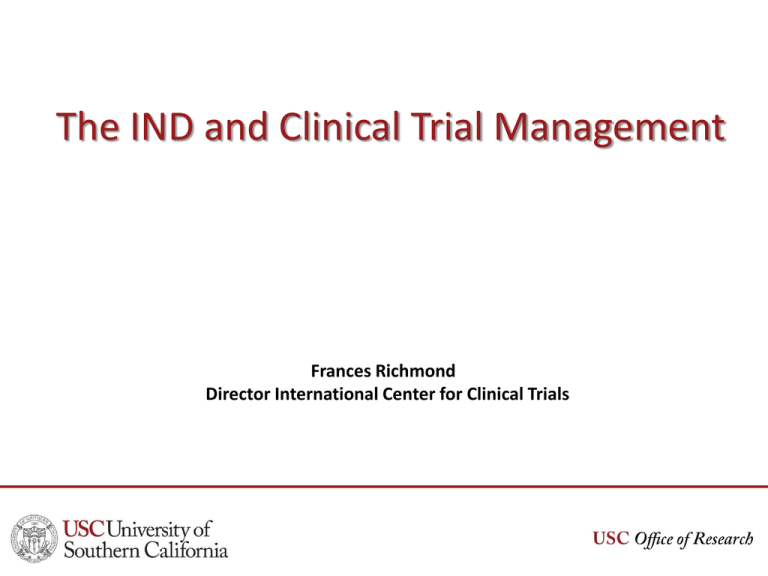
The IND and Clinical Trial Management Frances Richmond Director International Center for Clinical Trials And you are… • The principal investigator of a company-sponsored trial? • The principal investigator of an investigator-sponsored trial? • A clinical coordinator for a study? Kefauver-Harris amendments required investigational new drug application and oversight for certain types of drug trials FDA has oversight if…. • You study a NEW drug or biologic in the US • You want to market a new indication or different route of administration EVEN THOUGH THE PRODUCT IS ALREADY APPROVED FDA has oversight whether…. You are the investigator and a company is the sponsor Probably monitored You are the sponsor-investigator Probably unmonitored If you are an investigator-sponsor… You must submit an investigational device exemption You must sign a 1571 form that obligates you to the responsibilities of monitoring and reporting to FDA You must submit interim and final reports Three Main Parts to an IND This starts as a protocol and grows Investigators must sign form 1572 I agree…to make those records available for inspection Pre-study Activities Sponsor/CRO Site Visit • • • • Suitability of the Investigator for the protocol. Presence and experience of staff. Availability of patients. Availability of adequate facilities including patient exam rooms, a secure drug location, equipment, specialized instruments or devices required in the protocol. Pre-Study Activities Internal Site Evaluation • Is the study of interest to us? • Do we have the necessary staff and training? • Do we have or can we obtain necessary equipment? • Does patient recruitment seem feasible? • What about the budget? The investigator’s brochure is your bible You will look here for the • protocol—that you must follow • Adverse events-adverse events not in this brochure are unexpected and may need to be reported differently ICH Good Clinical Practice Guidelines Excellent overview accepted for foreign as well as US trials Useful set of recommended documents at http://www.ich.org/fileadmin/Public_Web_Site/ICH_Products/Guidelines/Efficacy/E6_R1/Step4/E6_R1__Guideline.pdf This is the standard to which you will be audited Be aware of regulations governing recruitment Documentation Is Important! • Keeps track of events and data • Keeps track of steps in procedures • Keeps track of who administers tests • Keeps track of unplanned events forms 14/22 Case Report Form Source document 15/22 Make it easy for the staff – avoid mistakes • Gray out areas that should NOT be filled • Have consistent format: date, time, order, font. Date Test 1 Test 2 2 weeks prior Day 1 2 weeks 4 weeks Walk the coordinator through the questions: 2. For male subjects, skip to question 5. 3. Is the subject of childbearing age? Yes No 4. If yes, if the subject employing adequate contraceptive protection? 16/22 What happens during an audit? What do you mean, the FDA is here!!??? Routine audits For cause audits Where are areas of focus? Look to warning letters for insights Informed consent Product accountability Protocol integrity and deviations Protocol design and change control Source records and case report forms Form 1483 Complaints to CDER Most complaints are come from drug sponsors and monitors, followed by private citizens The complaints most likely to trigger inspections come from participants Complaints lead to inspections about 30% of the time If you are the investigator/sponsor… You have reporting responsibilities to FDA Be sure that you are sending your adverse events to the FDA according to rules Ensure that you have sent changes in protocol to FDA and IRB Ensure that your informed consent form has been updated with any changes in risk Think about test and control articles • Accountability • Randomization adherence http://apps.who.int/medicinedocs/documents/whozip10e/p08b.gif Train your staff • • • • They know the informed consent process They know the way to deal with adverse events They know the protocol They have signed the staff list Courses are available… For example… MPTX 517 – Structure and Management of Clinical Trials MPTX 522 – Clinical Design http://regulatory.usc.edu



